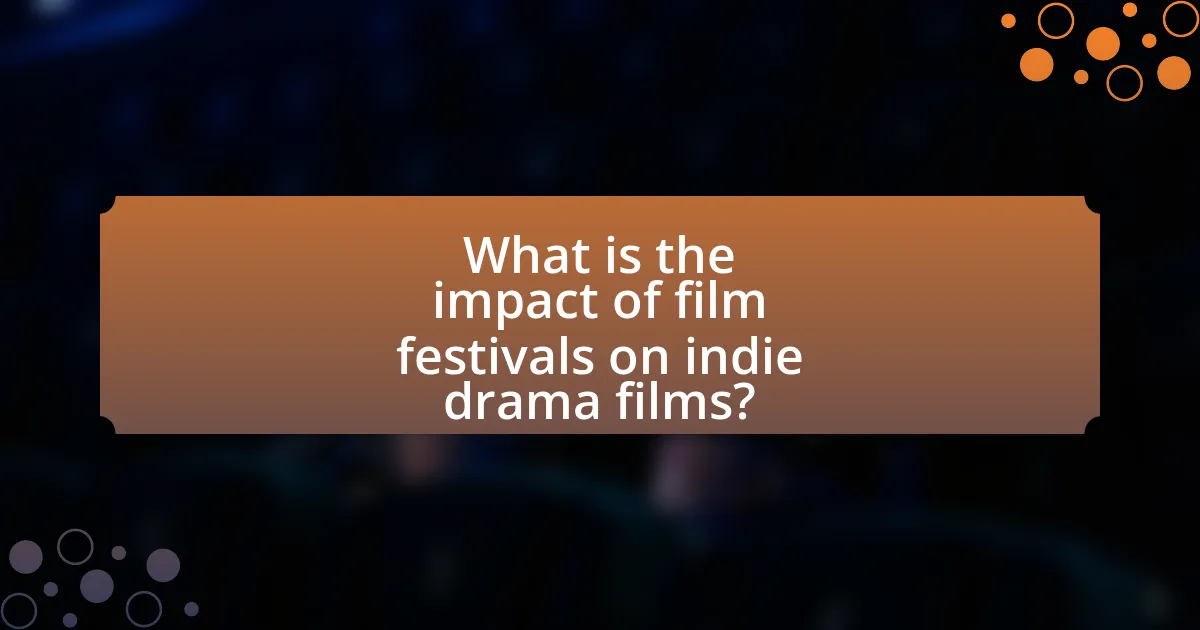The article examines the significant impact of film festivals on the success of indie drama films. It highlights how festivals enhance visibility, provide networking opportunities, and lead to potential distribution deals, with notable examples like the Sundance Film Festival. The discussion includes the role of audience engagement, marketing strategies, and the challenges faced by indie filmmakers in a competitive environment. Additionally, it explores the varying effects of different festival sizes and types, as well as emerging trends such as virtual festivals and the importance of audience feedback. Overall, the article underscores the critical role that film festivals play in shaping the careers of indie drama filmmakers.

What is the impact of film festivals on indie drama films?
Film festivals significantly enhance the visibility and success of indie drama films. They provide a platform for filmmakers to showcase their work to industry professionals, critics, and audiences, often leading to distribution deals and increased funding opportunities. For instance, the Sundance Film Festival has been instrumental in launching the careers of numerous indie filmmakers, with films like “Little Miss Sunshine” and “Whiplash” gaining critical acclaim and commercial success after their festival debuts. Additionally, participation in festivals can lead to awards recognition, which further elevates a film’s profile and marketability.
How do film festivals influence the visibility of indie drama films?
Film festivals significantly enhance the visibility of indie drama films by providing a platform for exposure to industry professionals, critics, and audiences. These events often attract media attention, which can lead to increased coverage and reviews that elevate the film’s profile. For instance, the Sundance Film Festival has been known to launch the careers of numerous indie filmmakers, with films like “Little Miss Sunshine” gaining widespread recognition and distribution deals after premiering there. Additionally, festivals facilitate networking opportunities that can connect filmmakers with potential investors and distributors, further amplifying their reach.
What role do film festivals play in audience engagement for indie dramas?
Film festivals play a crucial role in audience engagement for indie dramas by providing a platform for filmmakers to showcase their work directly to viewers. These events facilitate personal interactions between filmmakers and audiences, fostering discussions that enhance viewer investment in the films. According to a study by the University of Southern California, 70% of festival attendees reported feeling more connected to the films after participating in Q&A sessions with the creators. Additionally, film festivals often attract media attention and industry professionals, which can amplify audience interest and lead to increased viewership beyond the festival circuit. This combination of direct engagement and broader exposure significantly contributes to the success of indie dramas.
How do film festivals affect the marketing strategies of indie drama films?
Film festivals significantly influence the marketing strategies of indie drama films by providing a platform for exposure, networking, and audience engagement. These festivals serve as critical venues where filmmakers can showcase their work to industry professionals, critics, and potential distributors, which can lead to increased visibility and promotional opportunities. For instance, the Sundance Film Festival has historically launched the careers of numerous indie films, with many achieving commercial success post-festival. Additionally, participation in festivals often leads to strategic partnerships and collaborations, enhancing marketing efforts through shared resources and audience reach. The competitive nature of festivals also encourages filmmakers to refine their marketing narratives, focusing on unique selling points that resonate with festival audiences and critics alike.
Why are film festivals important for the success of indie drama films?
Film festivals are crucial for the success of indie drama films because they provide a platform for exposure, networking, and potential distribution opportunities. These festivals attract industry professionals, critics, and audiences, allowing indie filmmakers to showcase their work to a wider audience. For instance, the Sundance Film Festival has historically launched the careers of numerous indie filmmakers, with films like “Little Miss Sunshine” and “Whiplash” gaining significant attention and distribution deals after their premieres. Additionally, participation in festivals can lead to awards and accolades, which enhance a film’s credibility and marketability. Thus, film festivals play a vital role in elevating indie drama films within the competitive film industry landscape.
What opportunities do film festivals provide for networking in the indie film community?
Film festivals provide significant networking opportunities for the indie film community by facilitating direct interactions among filmmakers, industry professionals, and audiences. These events often feature panels, workshops, and Q&A sessions that allow filmmakers to connect with potential collaborators, distributors, and investors. For instance, the Sundance Film Festival has been known to launch careers and foster relationships that lead to future projects, as evidenced by numerous successful collaborations that originated from networking at the festival. Additionally, festivals create a platform for filmmakers to showcase their work, attracting attention from agents and producers looking for new talent, thereby enhancing the chances of securing funding and distribution deals.
How do awards and recognition at film festivals impact indie drama films?
Awards and recognition at film festivals significantly enhance the visibility and marketability of indie drama films. Winning or being nominated for prestigious awards can lead to increased media attention, which often results in higher audience turnout and interest. For instance, films that receive accolades at festivals like Sundance or Cannes frequently secure distribution deals, as evidenced by the success of films such as “Little Miss Sunshine,” which gained critical acclaim and commercial success after its festival run. Additionally, awards can validate the artistic merit of a film, attracting investors and collaborators for future projects, thereby fostering a sustainable career for indie filmmakers.
What challenges do indie drama films face at film festivals?
Indie drama films face significant challenges at film festivals, primarily due to intense competition, limited marketing budgets, and difficulties in audience engagement. The competition is fierce, with thousands of submissions vying for a limited number of screening slots, making it hard for indie films to stand out. Additionally, indie filmmakers often operate with constrained marketing resources, which hampers their ability to promote their films effectively compared to larger productions. Furthermore, engaging audiences in a festival setting can be challenging, as many attendees may prioritize mainstream films or have preconceived notions about indie cinema, limiting the reach and impact of these films.
How do competition and selection processes affect indie drama filmmakers?
Competition and selection processes significantly impact indie drama filmmakers by determining their access to funding, distribution, and audience exposure. These filmmakers often rely on film festivals as critical platforms for showcasing their work, where selection into prestigious festivals can lead to increased visibility and opportunities for collaboration. For instance, a study by the University of Southern California found that films selected for major festivals like Sundance or Cannes often see a substantial boost in box office revenue and distribution deals, highlighting the importance of these competitive processes. Consequently, the outcomes of these competitions can either enhance or hinder the careers of indie drama filmmakers, shaping their future projects and industry relationships.
What are the common pitfalls for indie drama films at festivals?
Common pitfalls for indie drama films at festivals include poor marketing strategies, inadequate networking, and failure to understand the festival’s audience. Poor marketing can lead to low visibility, as many indie films lack the promotional budgets of larger productions. Inadequate networking prevents filmmakers from building essential industry connections, which can hinder future opportunities. Additionally, failing to tailor the film to the specific audience of the festival can result in negative reception, as festivals often have distinct themes or preferences that influence programming decisions. These pitfalls can significantly impact the success and reception of indie drama films at festivals.

How do different film festivals vary in their impact on indie drama films?
Different film festivals significantly vary in their impact on indie drama films based on their prestige, audience reach, and industry connections. Prestigious festivals like Sundance and Cannes provide substantial visibility and networking opportunities, often leading to distribution deals and critical acclaim. For instance, films that premiere at Sundance frequently secure distribution contracts, as evidenced by the success of “Whiplash,” which gained significant attention and funding after its debut. In contrast, smaller festivals may offer less exposure but can still provide valuable platforms for niche audiences and local recognition, as seen with regional festivals that highlight community stories. Thus, the festival’s scale and reputation directly influence the potential success and trajectory of indie drama films.
What types of film festivals are most beneficial for indie drama films?
The most beneficial types of film festivals for indie drama films are specialized festivals that focus on independent cinema, narrative storytelling, and emerging filmmakers. These festivals, such as Sundance Film Festival, Tribeca Film Festival, and South by Southwest (SXSW), provide platforms that prioritize indie dramas, offering exposure to industry professionals, potential distribution deals, and audience engagement. For instance, Sundance has a history of launching successful indie dramas, with films like “Whiplash” and “The Birth of a Nation” gaining significant recognition and distribution after their premieres. Such festivals often feature awards and networking opportunities that can significantly enhance the visibility and success of indie drama films.
How do genre-specific festivals cater to indie drama films?
Genre-specific festivals cater to indie drama films by providing targeted platforms that enhance visibility and audience engagement. These festivals often focus on specific themes or styles, allowing indie drama filmmakers to connect with audiences who appreciate nuanced storytelling and character-driven narratives. For instance, festivals like the Sundance Film Festival and the Tribeca Film Festival have dedicated sections for indie dramas, showcasing films that might otherwise struggle for attention in broader festivals. This focused environment not only attracts industry professionals looking for unique content but also fosters networking opportunities that can lead to distribution deals. Additionally, genre-specific festivals often include panels and discussions that educate filmmakers on industry trends, further supporting the growth and success of indie drama films.
What is the significance of regional versus international film festivals for indie dramas?
Regional film festivals provide indie dramas with localized exposure and networking opportunities, while international film festivals offer broader visibility and access to global markets. Regional festivals often attract local audiences and industry professionals, facilitating connections that can lead to distribution deals or collaborations. For instance, the Sundance Film Festival, while international, has a strong regional focus that highlights American indie films, showcasing them to a relevant audience. Conversely, international festivals like Cannes or Berlin provide indie dramas with a platform to reach a worldwide audience, increasing the potential for international sales and critical acclaim. This dual significance underscores the importance of both types of festivals in enhancing the visibility and success of indie dramas in diverse markets.
How does the size of a film festival influence its impact on indie drama films?
The size of a film festival significantly influences its impact on indie drama films by determining the level of exposure and networking opportunities available to filmmakers. Larger festivals, such as Sundance or Cannes, attract a wider audience, including industry professionals, critics, and media, which can lead to increased visibility and potential distribution deals for indie films. For instance, a study by the University of Southern California found that films showcased at major festivals are more likely to secure distribution, with 70% of films at Sundance receiving offers compared to only 30% at smaller festivals. Additionally, larger festivals often provide more resources, such as workshops and panels, which can enhance the filmmakers’ skills and industry connections, ultimately contributing to the success of indie drama films.
What advantages do large film festivals offer to indie drama filmmakers?
Large film festivals provide indie drama filmmakers with significant exposure, networking opportunities, and potential distribution deals. These festivals attract industry professionals, critics, and audiences, allowing filmmakers to showcase their work to a wider audience. For instance, the Sundance Film Festival has historically launched the careers of many indie filmmakers, with films like “Little Miss Sunshine” gaining distribution and critical acclaim after their premieres. Additionally, participation in prestigious festivals can enhance a filmmaker’s credibility, making it easier to secure funding for future projects.
How do smaller, niche festivals support indie drama films differently?
Smaller, niche festivals support indie drama films by providing targeted audiences and specialized programming that larger festivals often overlook. These festivals focus on specific genres or themes, allowing indie filmmakers to connect with viewers who are genuinely interested in their work, which enhances audience engagement and feedback. For instance, festivals like the Sundance Film Festival and the Tribeca Film Festival have dedicated sections for indie dramas, showcasing films that might not receive attention in mainstream venues. This focused approach not only increases visibility for indie films but also fosters networking opportunities with industry professionals who are specifically interested in niche markets, thereby facilitating distribution deals and collaborations that are crucial for the success of indie drama films.
What trends are emerging in film festivals that affect indie drama films?
Emerging trends in film festivals that affect indie drama films include a growing emphasis on diversity and inclusion, increased use of digital platforms for screenings, and a focus on sustainability. Film festivals are increasingly prioritizing films that represent underrepresented voices, which enhances visibility for indie dramas that tackle social issues. Additionally, many festivals have adopted hybrid models, allowing for both in-person and virtual screenings, which expands audience reach and accessibility for indie filmmakers. Furthermore, the push for eco-friendly practices at festivals encourages indie filmmakers to adopt sustainable production methods, aligning their projects with contemporary values. These trends collectively enhance the opportunities for indie drama films to gain recognition and success in a competitive landscape.
How are virtual film festivals changing the landscape for indie dramas?
Virtual film festivals are significantly expanding the reach and accessibility of indie dramas. By eliminating geographical barriers, these festivals allow filmmakers to showcase their work to a global audience, increasing visibility and potential audience engagement. For instance, the 2020 Sundance Film Festival transitioned to a virtual format, resulting in over 1.1 million views, demonstrating the potential for wider distribution compared to traditional in-person events. Additionally, virtual platforms often reduce costs associated with travel and venue rentals, enabling more indie filmmakers to participate and present their films. This shift not only democratizes access to film festivals but also fosters a more diverse array of stories and voices in the indie drama landscape.
What role does audience feedback play in the evolution of indie drama films at festivals?
Audience feedback is crucial in shaping the evolution of indie drama films at festivals, as it provides filmmakers with direct insights into audience preferences and emotional responses. This feedback can influence narrative choices, character development, and pacing, allowing filmmakers to refine their work for broader appeal. For instance, studies have shown that films receiving positive audience reactions often see increased distribution opportunities and funding for future projects, demonstrating the tangible impact of audience engagement on a film’s trajectory. Additionally, festivals serve as a testing ground where filmmakers can gauge reactions and adapt their films accordingly, ultimately enhancing the quality and marketability of indie dramas.

What strategies can indie filmmakers use to maximize their success at film festivals?
Indie filmmakers can maximize their success at film festivals by strategically selecting festivals that align with their film’s genre and target audience. Research indicates that films screened at festivals with a strong reputation for specific genres, such as Sundance for independent dramas, have a higher chance of gaining visibility and attracting distributors. Additionally, filmmakers should focus on building a robust marketing campaign that includes social media engagement, press releases, and targeted outreach to industry professionals. According to a study by the University of Southern California, films that actively engage with audiences and critics before and during festivals tend to receive better reviews and increased interest from distributors. Networking with other filmmakers and industry insiders at these events can also lead to valuable connections and opportunities for collaboration, further enhancing the film’s prospects.
How can indie filmmakers effectively prepare for film festivals?
Indie filmmakers can effectively prepare for film festivals by thoroughly researching the festivals they plan to enter, ensuring their film aligns with the festival’s themes and audience. This preparation includes understanding submission guidelines, deadlines, and the specific preferences of festival programmers. For instance, the Sundance Film Festival emphasizes innovative storytelling and diverse voices, which indie filmmakers should consider when crafting their submissions. Additionally, filmmakers should create a compelling press kit that includes a synopsis, director’s statement, and high-quality stills, as this can significantly enhance their film’s visibility and appeal to festival audiences.
What are the key elements of a successful festival submission package?
A successful festival submission package includes a well-crafted film, a compelling synopsis, a professional cover letter, and high-quality promotional materials. The film must meet the festival’s technical specifications and thematic focus, ensuring it resonates with the audience and judges. A concise and engaging synopsis captures the essence of the film, while the cover letter should highlight the film’s unique aspects and the filmmaker’s background. Additionally, promotional materials such as stills, a poster, and a trailer enhance the package’s appeal, providing visual context that can attract festival programmers. These elements collectively increase the chances of selection, as evidenced by the fact that festivals often prioritize submissions that present a clear and professional image of the film and its creators.
How can filmmakers leverage social media to promote their films at festivals?
Filmmakers can leverage social media to promote their films at festivals by creating targeted campaigns that engage audiences and build anticipation. By utilizing platforms like Instagram, Twitter, and Facebook, filmmakers can share behind-the-scenes content, trailers, and festival updates, which can increase visibility and audience interest. For instance, a study by the University of Southern California found that films with active social media engagement saw a 20% increase in audience turnout at festivals. Additionally, filmmakers can collaborate with influencers and utilize hashtags related to the festival to reach broader audiences, enhancing their film’s presence and potential success.
What networking strategies should indie filmmakers employ at festivals?
Indie filmmakers should employ targeted networking strategies at festivals, such as attending panels and workshops, engaging in one-on-one conversations, and utilizing social media for outreach. Attending panels and workshops allows filmmakers to gain insights from industry experts and connect with peers who share similar interests. Engaging in one-on-one conversations fosters personal relationships, which can lead to collaborations and opportunities. Utilizing social media platforms, like Twitter and Instagram, enables filmmakers to follow festival hashtags, interact with other attendees, and promote their work, thereby expanding their network. These strategies are effective as they facilitate meaningful connections that can enhance the visibility and success of indie films in a competitive market.
How can filmmakers build relationships with industry professionals at festivals?
Filmmakers can build relationships with industry professionals at festivals by actively networking, engaging in discussions, and participating in panels or workshops. Networking is crucial as it allows filmmakers to meet producers, distributors, and other filmmakers, fostering connections that can lead to future collaborations. Engaging in discussions about their work and the industry can showcase their passion and knowledge, making them memorable to industry professionals. Additionally, participating in panels or workshops provides opportunities to share insights and learn from established figures, further solidifying relationships. According to a study by the University of Southern California, 70% of filmmakers reported that networking at festivals significantly contributed to their career advancement, highlighting the importance of these interactions.
What are effective ways to engage with audiences during film festivals?
Effective ways to engage with audiences during film festivals include hosting Q&A sessions, organizing panel discussions, and utilizing social media for real-time interaction. Q&A sessions allow filmmakers to connect directly with viewers, fostering a deeper understanding of the film’s themes and creative process. Panel discussions featuring industry experts can provide valuable insights and stimulate audience interest. Additionally, leveraging social media platforms enables filmmakers to engage with audiences before, during, and after the festival, enhancing visibility and encouraging dialogue. These methods have been shown to increase audience participation and satisfaction, ultimately contributing to the success of indie drama films showcased at festivals.
What common mistakes should indie filmmakers avoid at film festivals?
Indie filmmakers should avoid several common mistakes at film festivals to enhance their chances of success. One significant mistake is failing to research the festival’s audience and programming, which can lead to submitting films that do not align with the festival’s focus or demographic. Additionally, neglecting to network effectively can hinder opportunities for collaboration and exposure; building relationships with other filmmakers, industry professionals, and audiences is crucial. Another mistake is underestimating the importance of a strong marketing strategy; filmmakers should prepare promotional materials and engage on social media to create buzz around their film. Lastly, not being prepared for Q&A sessions can reflect poorly on the filmmaker; understanding the film’s themes and being ready to discuss them is essential for engaging with the audience. These mistakes can significantly impact the visibility and reception of indie films at festivals.
How can filmmakers ensure they are not overlooked during festival screenings?
Filmmakers can ensure they are not overlooked during festival screenings by actively engaging in marketing and networking strategies. Effective promotion of their films through social media, press releases, and targeted outreach to industry influencers can significantly increase visibility. According to a study by the University of Southern California, films that utilized social media campaigns prior to festivals saw a 30% increase in audience attendance compared to those that did not. Additionally, filmmakers should attend networking events and participate in Q&A sessions to build relationships with festival programmers and audiences, enhancing their chances of being remembered and recommended.
What are the best practices for following up after a film festival?
The best practices for following up after a film festival include sending personalized thank-you notes to festival organizers, engaging with audience feedback, and leveraging networking opportunities. Personalized thank-you notes demonstrate appreciation and can strengthen relationships with festival organizers, which may lead to future opportunities. Engaging with audience feedback allows filmmakers to understand viewer perceptions and improve future projects. Networking with industry professionals met during the festival can open doors for collaborations, distribution deals, or funding for subsequent films. These practices are supported by industry insights indicating that effective follow-up can significantly enhance a filmmaker’s visibility and career trajectory post-festival.
